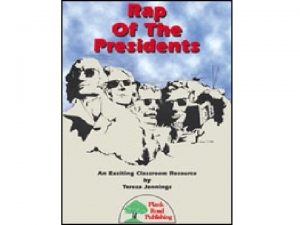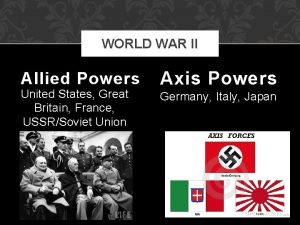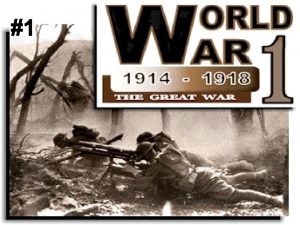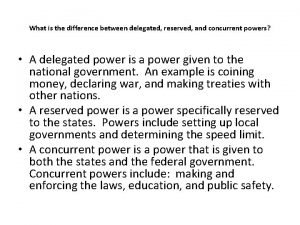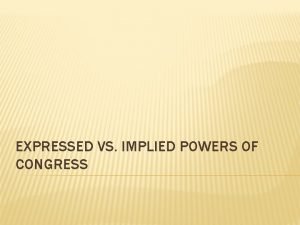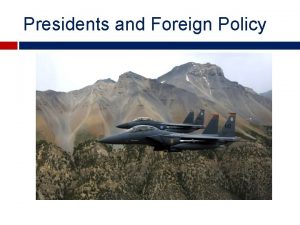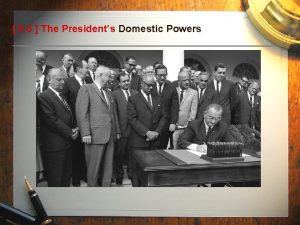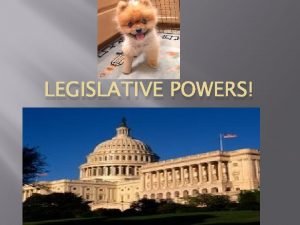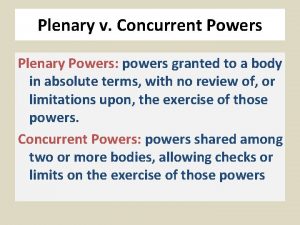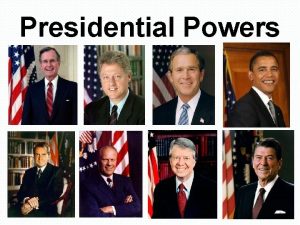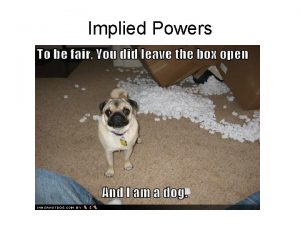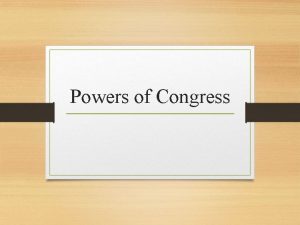The Presidents Domestic Powers Lecture on Domestic Powers










- Slides: 10

The President’s Domestic Powers -Lecture on Domestic Powers -Quick Write

Start Up Question Suppose you were one of the Framers of the Constitution. • What powers would you give the President? Think about the constitutional requirement that the President “take Care that the Laws be faithfully executed. ” Write three powers. • Powers of the President, According to Me: • ___________________________________ • __________________

• The Framers Debate – one-person executive branch. Presidential powers would be broad in foreign affairs, but limited in other areas • The Whig Theory – restrained approached to leadership – Congress would lead the policy process, while Presidents were limited to the expressed powers of the Constitution (outliers: Andrew Jackson and Abe Lincoln) • The Stewardship Theory – Presidents should not merely carry out the will of Congress but instead should lead the nation and build public support for particular policy agendas. The Growth of Presidential Power

Question What are some reasons for the Expansion of Power?

Executive Orders and Executive Privilege The President (Chief Executive) has the power to issue executive orders, which are directives, rules, or regulations that have the effect of law. Ordinance power – arises from the Constitution and acts of Congress

Continue…. • Executive Privilege – Constitution gives the President the inherent power to refuse to disclose certain information to Congress or to the federal courts

The Powers of Appointment and Removal A President cannot hope to succeed without loyal subordinates who support the policies of the President’s administration. The President names most the top-ranking officers of the Federal Government. Among them are: 1) ambassadors and other diplomats 2) Cabinet members and their top aides 3) the heads of independent agencies 4) all federal judges, U. S. marshals, and attorneys 5) all officers in the armed forces Whenever the President makes one of these appointments, the nomination is sent to the Senate. Senatorial Courtesy: an unwritten rule among senators not to vote for any presidential nominee who is opposed by the senators from the nominee’s home state (ex- Federal District Judge or a U. S. Marshal)

The Powers of Appointment and Removal The Senate must approve most presidential nominations. This process can be long and, at times, grueling for the nominee.

Presidential Powers Diplomatic Powers – Treaties, sending Ambassadors, visiting other countries leaders Military Powers – Sending troops or the use of military action Judicial Powers – Reprieve: postponement of the execution of a sentence Pardon: legal forgiveness of a crime Clemency: mercy or leniency maybe used in cases involving fed. offenses Legislative Powers – VETO power Executive Powers – Appointment/Removal Power

Quick Write (1/2 page) • Do you believe the Constitution grants the President too much power? Or do you think the President needs more unchecked power? Why? Support your answer
 These are the presidents mighty mighty presidents
These are the presidents mighty mighty presidents President informal powers
President informal powers 01:640:244 lecture notes - lecture 15: plat, idah, farad
01:640:244 lecture notes - lecture 15: plat, idah, farad Enumerated powers vs implied powers
Enumerated powers vs implied powers Was the united states on the axis powers or allied powers?
Was the united states on the axis powers or allied powers? What are implied powers
What are implied powers What were the 4 main causes of wwi
What were the 4 main causes of wwi Delegated powers vs. reserved powers
Delegated powers vs. reserved powers Implied powers vs expressed powers
Implied powers vs expressed powers Informal checks on the president
Informal checks on the president Gilded age presidents apush
Gilded age presidents apush
